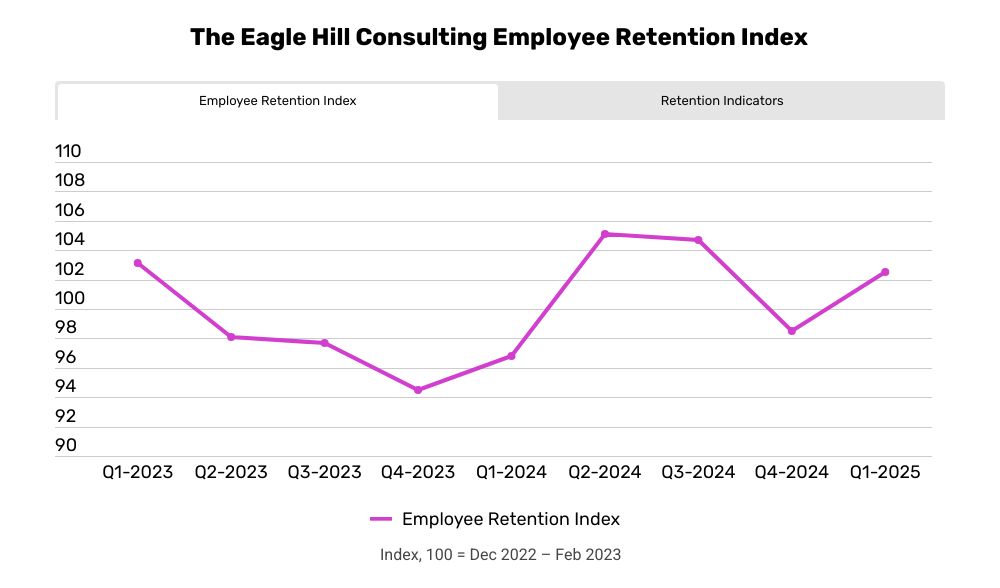
'It's a tough situation for employers who now must reduce their labour costs'

Employees in the United States are planning to stay in their current roles in the next six months, according to a new report, which revealed a growing confidence in employers but lower optimism in the job market.
The latest Eagle Hill Consulting Employee Retention Index slightly increased to 102.5 in the first quarter of 2025, up by 3.9 points from the previous findings.
"This signals that U.S. employees are more likely to stay in their jobs over the next six months," the report read. "Despite this upward shift, the Index remains below the peak observed in Q2 2024, continuing a broader downward trend."

The findings come amid higher organisational confidence (+2.7), according to the report. There are also improvements in compensation outlook (+3.3), as well as a renewed sense of connection to workplace culture (+2.6).
Among the generations currently in the workforce, Gen Z employees indicated the highest intentions to stay in their current jobs. According to the report, their retention index hit a record high of 112, up 17.2 points.
"Gen Z is the only generation whose retention outlook has consecutively improved in the last two periods, signalling an upward trend in their intention to stay in their jobs," it read.
Moreover, the report further found improved retention indicators for Gen Z employees. They are:
The rising intent to stay among employees comes in the wake of declining confidence in the job market, according to the Eagle Hill Consulting report.
Outlook in relation to job market opportunity declined 2.4 points to 99.6 in the first quarter, reflecting employees' perceptions about employment opportunities available.
"We're now in an environment where caution has overtaken confidence, and many companies already are making tough decisions about their workforce," said Melissa Jezior, president and chief executive officer of Eagle Hill Consulting, in a statement.
"The Index data indicate that employees are more likely to stay put in the coming months, and there's a rising sense of unease among workers regarding their job prospects."
The findings reflect recent unemployment concerns unveiled by the Federal Reserve Bank of New York.
According to its recent report, expectations of losing work in the next 12 months went up, while expectations of finding a job after losing one slightly declined.
The declining confidence in the job market follows the economic uncertainty in the United States resulting from the tariffs announced by US President Donald Trump.
David Solomon, chief executive of Goldman Sachs, warned that the prospect of recession in the US has increased. Bruce Kasman, JPMorgan's chief global economist, also warned of a higher risk of recession in the global economy following the tariffs.
Globally, some employers have announced layoffs to cushion the impact of Trump's tariffs, while there are others considering setting up in the US in response to the tariffs.
Jezior said the higher intent to stay among employees may not be a good sign for employers planning to make tough workforce decisions.
"While this is good news for employers facing chronic labour shortages, it's a tough situation for employers who now must reduce their labour costs," she said.
Julia Toothacre, chief career strategist at ResumeTemplates, told Fortune that HR leaders need to address the issue head on if they plan on making workforce cuts due to the tariffs.
"Leaders need to communicate how policies may impact their business and provide transparency where possible," Toothacre said as quoted by Fortune.
"If mass layoffs aren't planned, employees need to hear that. Workers need to know their jobs are safe."